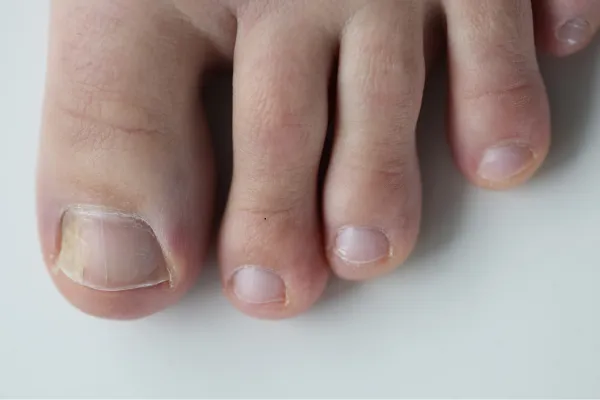Tips & Advice From Foot & Ankle Associates of Southern NH

Sesamoiditis: A Tiny Bone Causing Big Foot Pain
Most people have never heard of the sesamoid bones… until they start hurting.
If you’re feeling a sharp, aching pain right under the ball of your foot, especially beneath the big toe, you might be dealing with sesamoiditis.
The name may be a mouthful, but the condition is surprisingly common—and treatable. Let’s break down what’s happening, why it hurts, and how we help you get back on your feet.
What Is Sesamoiditis?
Your sesamoids are two tiny bones located under the joint of your big toe. Unlike most bones in the body, sesamoids aren’t connected to other bones—they’re embedded in tendons, helping absorb pressure and support movement in your forefoot.
Think of them like the kneecaps of your foot. Small, but incredibly important.
Sesamoiditis is simply inflammation of these bones and the surrounding tendons.
It’s usually caused by overuse, repetitive pressure, or a sudden impact.
Common Symptoms
You might have sesamoiditis if you’re feeling:
Pain in the ball of your foot, especially beneath the big toe
Swelling or bruising in the area
Pain that worsens when pushing off the toe while walking or running
Tenderness when pressing on the area
Some people even mistake it for a stress fracture—but sesamoiditis often builds gradually rather than coming from a single injury.
Who’s at Risk?
Sesamoiditis can affect anyone, but it’s more common in:
Runners and dancers
People who wear high heels or unsupportive shoes
Those with high arches or bony feet
Athletes in high-impact sports (like basketball or tennis)
Basically, if your forefoot takes a lot of pressure—you’re at higher risk.
How Podiatrists Treat Sesamoiditis
The good news? Most cases don’t require surgery. At Foot & Ankle Associates of Southern NH, we focus on conservative, effective treatment first.
Here’s what that usually looks like:
1. Rest and Activity Modification
Taking pressure off the foot is key. We may recommend a break from high-impact activities while healing begins.
2. Padding or Taping
We can apply padding or tape to offload pressure from the sesamoid area and reduce strain on the joint.
3. Custom Orthotics
These provide targeted support and cushioning to relieve pressure under the ball of your foot.
4. Anti-Inflammatory Treatment
Ice, oral medication, or even laser therapy may be used to reduce inflammation and speed up recovery.
5. Proper Footwear Guidance
Supportive shoes with stiff soles can help reduce flexing of the toe joint, which often aggravates symptoms.
When Is Surgery Needed?
In rare, chronic cases—especially when the bone is fractured or severely inflamed—surgery may be considered. But with early care, most people recover well without needing it.
Don’t Ignore Ball-of-Foot Pain
Even small bones can cause big problems when they’re under constant stress. If you’ve been dealing with pain near your big toe for more than a few days, it’s time to get it checked.
At our clinic, we’ll evaluate your symptoms, take imaging if needed, and walk you through a plan to relieve pain and prevent it from coming back.
Let’s get you walking comfortably again.
Book a visit today—we’re here to help your feet feel better, one step at a time.
Ask Foot & Ankle Associates of Southern NH And Their Team
Fill in the form to request a call from our team. One of our team members will call you for FREE and answer any questions or concerns you may have about your condition
Where To Find Foot & Ankle Associates of Southern NH

If you have any questions before scheduling an appointment or for general inquiries, please use the contact us button below. Our team will promptly reach out to assist you.
Opening Hours
Monday: 8:00am – 5:00pm
Tuesday: 8:00am – 5:00pm
Wednesday: 8:00am – 2:00pm
Thursday: 8:00am – 5:00pm
Friday: 8:00am – 2:00pm
Saturday: Closed
Sunday: Closed

